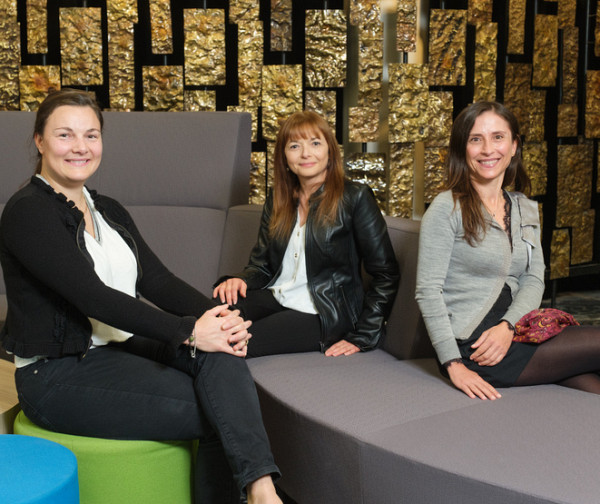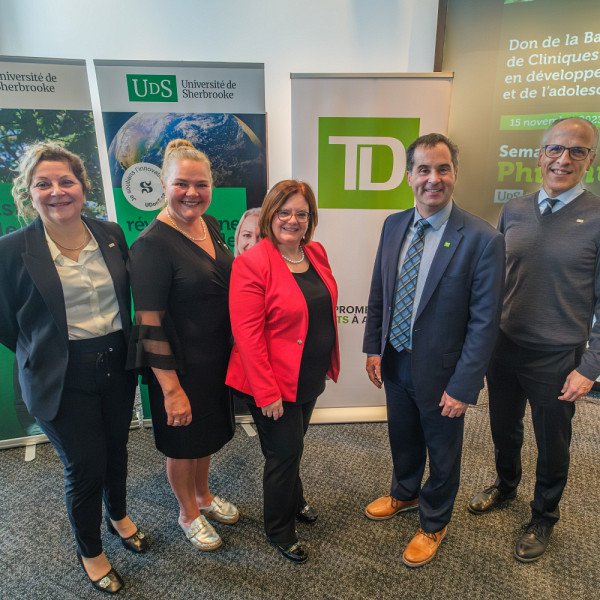
In Estrie and Montérégie, more than 700 young people are waiting for mental health services. It can take up to three months before receiving an evaluation. During this time, difficulties persist and worsen for young people and their families. If it takes a village to raise a child, it also needs one that can help him when his life gets complicated.
This type of village will take its form with the establishment of three interdisciplinary clinics for the development of children and adolescents in 2024, a unique concept that combines the interventional expertise of the Faculty of Literature and Science, Human Resources and the Faculty of Educational Sciences in a personalized, multidimensional and multidisciplinary approach for each the young person in care as well as their family.
Children and adolescents with multiple diagnoses require the mobilization of numerous resources from different practices. What we want with these clinics is to learn to work together, learn to “build a village”, for the benefit of these children, and give them the means to progress.
The six departments that will work as a team have the expertise to approach the trials, achievements and crises of young people from a different angle, specific to their disciplinary tools. Often the key – and the challenge – is to bring them together.
Professor Anick Lessard, dean of the Faculty of Letters and Humanities
Like several other university clinics at UdeS, the concept involves students deepening their learning by combining theories and field experiences. This experience equips them by improving their skills in intervention and management of complex cases even before they enter their practice.

Photo: Michel Caron, UdeS
Practical training contexts, such as the Interdisciplinary Clinic, enrich students’ academic careers and promote the development of their professional and personal skills. These contexts therefore equip them to a greater extent to intervene in an effective and targeted way, taking into account the real needs and interests of each student.
Professors Pascale Nootens, Agnès Costerg and Carolina Gonçalves, co-directors of the Pierre-H.-Ruel Clinic of the Faculty of Education
The interdisciplinary model of the new clinics offers, upon the arrival of the young person and their family to the services, the care of a team of students from several psychosocial and educational disciplines, under the supervision of experts. The team recognizes and prioritizes issues, problems and needs, while focusing on the young person’s skills. From there, the overall portrait results in an intervention or service plan that also takes into account the environment in which it operates.
Putting each young person at the center of the process, across all disciplines, will provide a rich portrait of the best intervention options. This innovative approach to decompartmentalizing practices has the potential to significantly transform educational and social intervention in the short, medium, and long term.
Professor Anne Lessard, Dean of the Faculty of Education
Three change clinics in Sherbrooke, Longueuil and Granby
The interdisciplinary clinic in Sherbrooke will be an extension of the services already offered at the Pierre-H clinic. Ruel, which has been serving young clientele for many years and which will double or even triple student involvement by implementing an interdisciplinary component of six departments.
In the Granby region, where socio-economic issues create significant needs, the new clinic will increase the services offered to the 0-18 population, especially for disadvantaged and vulnerable clientele, in close collaboration with the educational communities and the community.
In Longueuil, the new interdisciplinary clinic will enhance services already offered at the Longueuil campus in the Childhood and Adolescence Assessment and Intervention Clinic (CEIEA).
Annually, up to 1,300 UdeS students will have experience offered by one or the other of the three clinics by 2028. In addition, the three clinics are fertile ground for documenting interventions and their effects, with the aim of improving them.
The interdisciplinary clinic will provide a rich context for the development of research from an interdisciplinary perspective for the benefit of students and their families. Involved from their initial training in major projects, students will be guided to develop the first research bases, in order to mobilize them in their practice. In this perspective, students will play a leading role in establishing true interprofessional collaboration, crucial for multidisciplinary intervention.
Professors Pascale Nootens, Agnès Costerg and Carolina Gonçalves, co-directors of the Pierre-H. – Ruel
Goals that go beyond the village
For those responsible for this large project, each young person who will receive services in one of the clinics is at the center of a process that offers them an innovative intervention solution, while allowing students to benefit from an innovative formula, focused on practice, in an interprofessional and interdisciplinary context and by improving research on assessment and intervention practices in childhood and adolescence.
With this project, the University of Sherbrooke becomes a pioneer in intervention with young people and their families. Interdisciplinary clinics carry a vision of the future in order to effectively and harmoniously respond to the needs of people facing vulnerable situations. This approach, first tested in the “village”, could inspire Quebec as a whole.
A significant donation for starting clinics

Photo: Michel Caron UdeS
Thanks to a major contribution of $750,000 from TD Bank Group, the University of Sherbrooke can now take the first steps in this interdisciplinary child and adolescent development clinic project. By cooperating with the TD project, it shows its significant contribution to the application of new practices in education and social sciences, for the benefit of children and adolescents.
“As Philanthropy Week takes place at UdeS, we are proud to reveal this collaboration. “In the perspective of the natural continuity of its previous and current obligations with UdeS, TD takes concrete actions to ensure the well-being of young people, while promoting the training of our students through practice,” the professors emphasize. Anne Lessard, dean of the Faculty of Education and Anick Lessard, dean of the Faculty of Letters and Humanities.
“As part of TD ready to act promises, our corporate citizenship platform, we are committed to supporting initiatives that aim to create a world where every person can thrive and develop to their full potential. We are therefore happy to contribute to this great project developed by the University of Sherbrooke, which will allow young people with mental health problems and their families to benefit from comprehensive support, thanks to students collaborating from complementary sectors,” points out Isabelle Ménard, First Vice President, Mid-sized Business Market, Quebec and Atlantic District and National Commercial Accounts in Quebec.
See all photos during the announcement of TD Bank’s large donation for this project.
About the Great UdeS campaign
Since its foundation, the University of Sherbrooke has innovated, pushed boundaries and ways of working, and made avant-garde decisions. These orientations shaped his identity and are a source of pride for the entire university community. Today, it is in the same frame of mind that the institution is undertaking the next chapter of its development, with its flagship funding campaign, Choosing to Change the Future. This $250 million campaign, the most ambitious in its history, will support more than 150 inspiring projects that will provide concrete solutions to the challenges of today and tomorrow.

